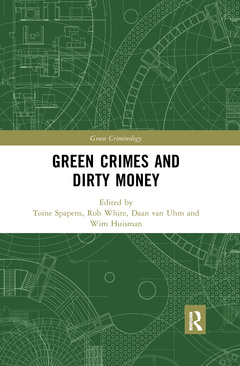Description
Green Crimes and Dirty Money
Green Criminology Series
Coordinators: Spapens Toine, White Rob, van Uhm Daan, Huisman Wim
Language: English
Subjects for Green Crimes and Dirty Money:
Keywords
Environmental Crime; Green Criminological; Amy Couper; Illegal Wildlife Trade; Anna Rita Germani; Waste Trafficking; Antonio Pergolizzi; South Wales Land; Avi Brisman; Wildlife Trafficking; Daan van Uhm; Money Laundering; Filippo Reganati; Environmental Crime Cases; Green Criminology; Environmental harm; Financial crime; Corporate responsibility and ethics; Money laundering; Crime control; Trade in illegal wildlife; Eco-mafia; Reparative justice; Corporate Environmental Crime; Jakob Koegst; Illegal Logging; Karin van Wingerde; State Corporate Crime; Lieselot Bisschop; Corporate Crime; Marieke Kluin; Wildlife Trade; Michael Levi; Waste Industry; Nadja Guenster; Organised Crime Involvement; Nanina van Zanden; Vice Versa; Nigel South; Environmental Performance Lead; Reece Walters; Specialist Environmental Courts; Rob White; Waste Sector; Rudie Neve; EPBC Act; Ruth McKie; Ecological Modernisation; Vincenzo Ruggiero; EU ETS; Wim Huisman; Carbon Markets; Ivory Coast; EU Emission Trading System
Publication date: 07-2020
· 15.6x23.4 cm · Paperback
Publication date: 06-2018
· 15.6x23.4 cm · Hardback
Description
/li>Contents
/li>Readership
/li>Biography
/li>
Environmental crimes are primarily driven by financial motives. The combined financial value of illicit trade in protected wildlife, illegal logging and waste trafficking is estimated to come directly after counterfeiting, the narcotic drugs trade and illegal gambling. Logically, the proceeds of these crimes must also be laundered. Goods, however, are not the only money maker for environmental criminals. Corporations may also try to ?save? costs by not complying with environmental regulations and thus commit crimes of omission rather than commission. From an enforcement and compliance perspective focusing on the proceeds of crime may therefore be an effective strategy.
This book brings together different perspectives on the financial aspects of environmental crime and harm from a green criminological viewpoint. It addresses the role of economic systems, the value of environmental performance for corporations, money laundering in the context of environmental crime, financial investigation and questions of regulation and penalties.
Discussing these topics from the view of green criminology, sociology and governance, this book will be of great interest to all those concerned about the financial dimensions of crime and the environment.
Introduction; Part I: Systemic drivers of green crimes; 1. Destruction and the philosophy of desire; 2. Environment, Conflict and Profit: Harmful resource exploitation and questionable revenue generation; 3. Eco-mafia and Environmental Crime in Italy: Evidence from the Organised Trafficking of Waste; 4. Supply and demand: Regulation and the trade in illegal wildlife; Part II: Corporations, environmental violations and the money; 5. The ‘Dieselgate’ scandal: a criminological perspective; 6. Environmental Responsibility and Firm Value; 7. Too big to deter, too small to change? Profitability and environmental compliance in the waste and chemical industry in the Netherlands; 8. Waste crime from three criminological perspectives. Implications for crime control and harm prevention; Part III: Financial regulation and enforcement; 9. Green with Envy: Environmental Crimes and Black Money; 10. Wildlife and laundering: interaction between the under and upper world; 11. The limits of ecological modernisation to effectively manage greenhouse gas emissions. A case study of carbon market crime; 12. Financial investigation in environmental crime cases in the Netherlands; 13. Sentencing Environmental Offenders: It is Not Just About the Money;
Toine Spapens is Full Professor of Criminology at Tilburg University, the Netherlands.
Rob White is Professor of Criminology at the University of Tasmania, Australia.
Daan van Uhm is Assistant Professor of Criminology at the Willem Pompe Institute for Criminal Law and Criminology, University of Utrecht, the Netherlands.
Wim Huisman is Professor of Criminology and Chair of the Department Criminology at VU University Amsterdam, the Netherlands.




